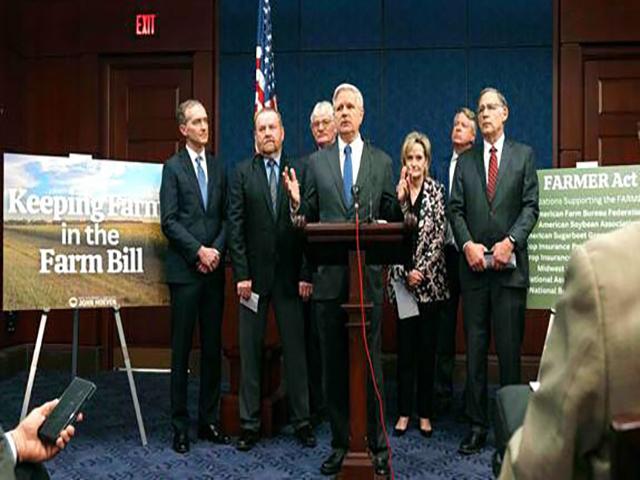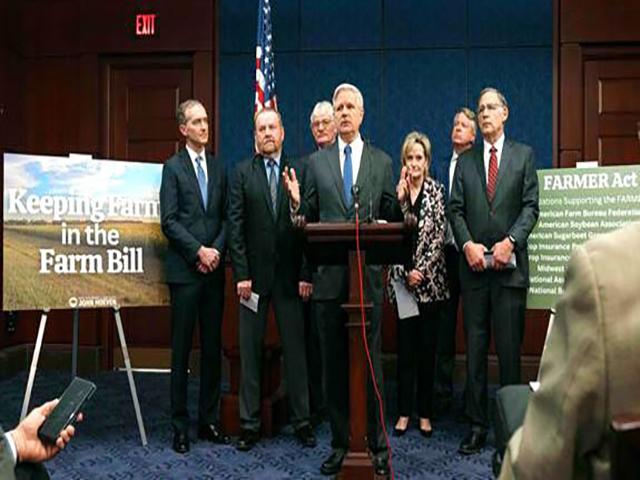Ag Policy Blog
GOP Senators Introduce Crop Insurance Bill
Sen. John Hoeven, R-N.D., ranking member on the Senate Agriculture Appropriations Subcommittee and a member of the Senate Agriculture Committee, on Tuesday introduced the Federal Agriculture Risk Management Enhancement and Resilience (FARMER) Act.
The bill would increase premium support for farmers' crop insurance bills and make higher levels of coverage more affordable for producers.
Co-sponsors of the bill include Sen. John Boozman, R-Ark., ranking member on the Senate Agriculture Committee, and Republican Sens. Joni Ernst and Chuck Grassley of Iowa, Deb Fischer of Nebraska, Roger Marshall of Kansas, and Cindy Hyde-Smith of Mississippi.
In a news release, Hoeven said the bill would "increase premium support for higher levels of crop insurance coverage, which will enhance affordability and reduce the need for ad-hoc disaster assistance."
BOOST PREMIUM SUBSIDIES FOR HIGHER COVERAGE LEVELS
The bill would increase premium support for certain revenue protection and yield protection policies at the 80% coverage level from 68% to 77%, and at the 85% coverage level from 53% to 68%.
Hoeven also said the bill would "improve the Supplemental Coverage Option (SCO) by increasing premium support and expanding the coverage level, providing producers with an additional level of protection."
SCO Coverage
Boozman said the bill would increase the premium support for the SCO, an area-based plan, from 65% to 80% and increase the SCO coverage level from 86% to 90%.
Hoeven and Boozman said the bill would direct the Risk Management Agency (RMA) to conduct a study to improve the effectiveness of SCO in counties larger than 1,400 square miles.
P[L1] D[0x0] M[300x250] OOP[F] ADUNIT[] T[]
Hoeven emphasized that the bill would not require producers to choose between purchasing enhanced crop insurance coverage or participating in Agriculture Risk Coverage (ARC) and Price Loss Coverage (PLC) programs.
ALTERNATIVE TO CHAIRWOMAN'S PROPOSAL
The FARMER Act would be attached to the farm bill and is seen as an alternative to the proposal of Senate Agriculture Committee Chairwoman Debbie Stabenow, D-Mich., which would require farmers to choose between more support for higher levels of coverage and participation in ARC and PLC.
Hoeven said his legislation is supported by a long list of farm organizations.
Hoeven released a summary and text of the bill and statements of support from senators and farm groups.
The four-page bill text does not address how much the program would cost or where the budget authority would come from. Republicans have previously said that money for the farm programs could come from restrictions on future rewrites of the Supplemental Nutrition Assistance Program (SNAP) and from the conservation programs in the Inflation Reduction Act. Stabenow has led Democrats in opposing the use of SNAP or IRA budget authority for commodity programs.
National Corn Growers Association (NCGA) First Vice President Kenneth Hartman Jr., who was present at the press conference on Capitol Hill, said, "Increasing the affordability of crop insurance is a top priority for our farmers. We applaud Sen. Hoeven and his colleagues' efforts in ensuring that these risk management tools continue to be improved and meet the challenges producers face today."
CRITICISM OVER HIGHER INSURANCE COSTS
The Environmental Working Group, a frequent critic of crop insurance, issued a negative statement on the bill.
Anne Schechinger, EWG Midwest director, said, "Both of the FARMER Act's proposed changes to crop insurance would drive up taxpayer costs for an already expensive program. The program currently costs billions of dollars each year yet mostly benefits the largest and wealthiest farms, who do not need more taxpayer support.
"In a year when it will be difficult to find money to increase funding for any program in the farm bill, the Senate should focus not on increasing crop insurance subsidies but instead on reducing the costs of the crop insurance program and protecting conservation funding for climate-smart agriculture," Schechinger added.
CROP INSURANCE A VITAL SAFETY NET
In the news release, Hoeven said, "Crop insurance is an essential piece of the farm safety net, providing farmers with their most important risk management tool as they work to continue providing Americans with the highest quality, lowest cost food supply in the world. I have heard from producers across North Dakota about the need to make this important program more affordable. As such, we're working to not only defend crop insurance, but improve it. That's how we're going to keep the farm in the farm bill. My legislation will make higher levels of coverage more affordable across the country, especially in states where it's currently prohibitively expensive to buy up. Ultimately, producers buying higher levels of coverage will lessen the need for ad-hoc disaster assistance in the future. That means a more resilient ag economy and a better deal for taxpayers."
In a speech on the Senate floor, Boozman said, "I commend Sen. Hoeven's leadership in introducing the FARMER Act and proactively addressing the needs of farmers and ranchers who have asked for improvements to the federal crop insurance program. The FARMER Act includes critical components to modernizing the farm safety net for producers across all regions and all commodities. We can pass a farm bill that strengthens Title I and Title XI while also making improvements across every other title to meet our shared goals. This isn't an either-or decision. The next farm bill provides an incredible opportunity to make things right for farmers, ranchers, rural communities and those in need."
Also see, "Despite Presidential Election, Farm Bureau Sees a Path for Congress to Pass a Farm Bill," https://www.dtnpf.com/…
Jerry Hagstrom can be reached at jhagstrom@nationaljournal.com
Follow him on the social platform X @hagstromreport
(c) Copyright 2024 DTN, LLC. All rights reserved.






Comments
To comment, please Log In or Join our Community .